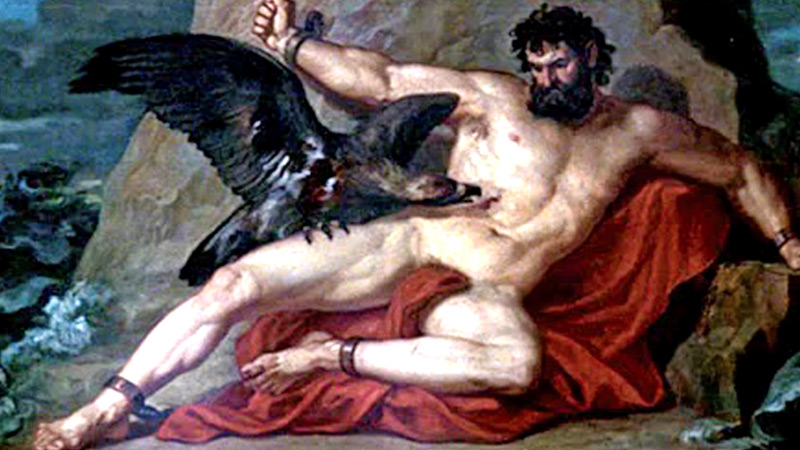The Tale of Prometheus is among the most popular Greek myths and tells the story of how this human loving Titan benefited mankind in various ways. The love he had for humankind brought him into conflict with Zeus the king of the gods. Prometheus means forethought in Greek and symbolises the intellect he possessed, which brought about his downfall.
The creation of mankind
Prometheus was the son of the Titan Iapetus, he and his brother Epimethus were spared from Tartarus as they had not joined in the fray against the Olympians in the Titanomachy but had sided with Zeus during the conflict. His brother Epimethus was a half-witted Titan whose name meant afterthought. Prometheus shaped out the figure of man while Athena breathed life into it. Prometheus assigned Epimethus to delegate qualities such as swiftness, cunning, strength, fur, wings among the creatures of earth; however by the time he got to the human he had run out of all the good qualities.
So Prometheus decided to make man upright like the gods and give them the gift of fire. Prometheus defies Zeus, the king of the gods, by stealing fire from the heavens and giving it to humanity. This act of defiance is crucial because fire, in ancient mythological terms, represents both literal warmth and light, as well as the metaphorical spark of civilization—tools, knowledge, and progress. He took the fire from the hearth of Zeus and brought it down to Earth. In some versions of the myth, Prometheus hid the fire in a fennel stalk to carry it safely.
Zeus’s Anger
Although Prometheus sided with Zeus and the Olympians during the Titanomachy he loved humans more and wanted to help them. When Zeus decreed that the newly formed humans must sacrifice animals in honour of the gods, Prometheus decides to trick Zeus and the gods into allowing that humans have the best part. He divided the meat into two sections.
One portion looked very appetising although it was composed of the meat and the bones, but he hid the bones inside a shiny layer of fat, making it appear as if the gods are being offered the best parts. Zeus, unaware of the trick, is asked to choose which portion should be given to the gods and which should go to the humans. He chooses the portion that looks more appealing (the fat-covered bones), believing it to be the best, while the portion with the meat and entrails goes to humans.
Once Zeus realises he has been tricked—because he is given the bones and fat, while humans get the choice meat—he becomes enraged. He feels humiliated by the trick and decides to punish humanity for the deceit. As punishment for this trick, Zeus takes away fire from humanity. He decides to withhold this crucial gift, which humans had previously received from Prometheus. Without fire, humans would remain in a primitive, vulnerable state, unable to cook, forge tools, or defend themselves properly.
Prometheus, in turn, defies Zeus yet again by stealing fire from the gods and giving it back to humanity.
Zeus, angered by this act of rebellion, punishes Prometheus harshly. He orders that Prometheus be bound to a mountain, where an eagle would eat his liver every day, only for it to regenerate each night, causing him endless suffering. The punishment was to continue until an immortal were to sacrifice his life while a mortal had to rescue him from the bounded mountain. This punishment is meant to serve as an eternal reminder that no one, not even a Titan, is above the will of the gods. Despite the punishment Prometheus endures, the fire he gave to humanity enables them to advance. It allows them to cook food, forge metal, keep warm, and create technology, which leads to the development of civilisation. Eventually, Prometheus is freed by the hero Heracles (Hercules), who kills the eagle and frees him from his chains. Meanwhile the centaur Chiron agrees to sacrifice his life to save Prometheus. This marks the end of his suffering, although the deeper themes of the myth about human progress, divine power, and the cost of defying the gods remain.
Symbolism
The fire symbolises knowledge, enlightenment, and the ability to shape the world. Prometheus’s act represents the dangerous yet transformative power of knowledge. In a broader sense, it can be seen as a metaphor for human curiosity and the pursuit of progress, even in the face of resistance or punishment.
Prometheus is often depicted as a trickster figure, one who defies authority and brings benefits to humans at great personal cost. His willingness to suffer for the good of humanity connects him to other mythological and cultural figures who challenge the established order.
The myth also reflects the relationship between mortals and gods. While the gods may withhold certain gifts from humanity, some figures—such as Prometheus—seek to subvert the divine hierarchy, challenging the gods’ monopolization of power and knowledge.
In many ways, Prometheus’s story is seen as a foundational myth about the origins of human civilisation, representing the transformative power of knowledge, creativity, and defiance. It continues to inspire interpretations about the human condition, the pursuit of wisdom, and the cost of progress.






